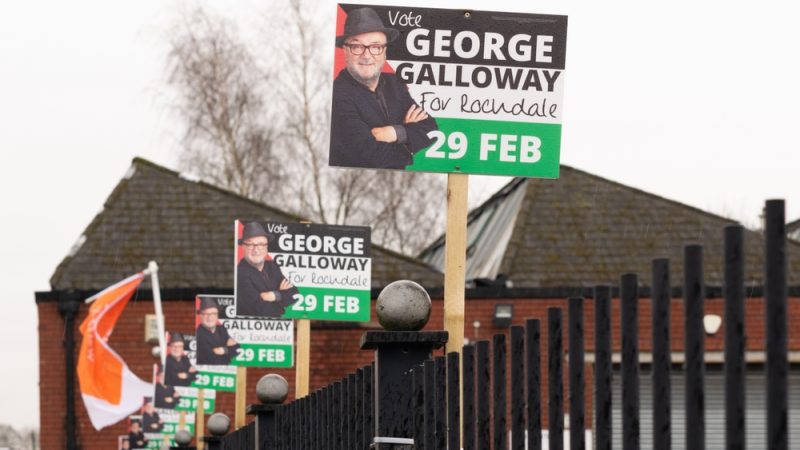
Labour nationally is polling at levels unseen for decades and is almost certain to win a substantial majority in the upcoming election. But that majority will likely be without the votes of a significant contingent of its erstwhile loyal base: urban left-wing voters and a large chunk of the Muslim community. Opinion polling now shows that Labour has lost almost 50% of Muslim voters who would have voted for the party in 2021.
George Galloway’s win in the Rochdale by-election is the first sign of this rumbling discontent. As New Statesman analysis suggests, a combination of white working-class voters and Muslim (also working-class) voters in the local community delivered this victory. There are other constituencies which Labour could very well suffer embarrassing losses in the upcoming election, many of them held by current shadow cabinet members.
Community-led initiatives like The Muslim Vote have now sprung up in a serious bid to challenge any MP that failed to vote for a ceasefire in Gaza in November. Demographic analysis on their website lists all the constituencies with an MP who abstained or voted against ceasefire in order of percentage Muslim electorate, alongside the sitting MP’s majority.
‘Streeting, Ashworth and Debbonaire could be at risk of losing seats’
This analysis suggests that seats like Wes Streeting’s in Ilford North do face a real challenge from independent, pro-ceasefire candidates; Streeting’s slender 2019 majority of 5,218 is heavily outweighed by a Muslim electorate of over 25,000.
Even if an independent challenger (Leanne Mohammad, a Palestinian from the local community, will be throwing her hat in the ring) doesn’t win the seat, it’s not unreasonable to predict that such a challenge could prevent Streeting from winning an overall majority.
Others whose seats are threatened include Jonathan Ashworth in Leicester South and Thangam Debbonaire in Bristol Central – where the Greens are polling slightly ahead of Labour.
Rushnara Ali in Bethnal Green and Stepney, Shabana Mahmood in Birmingham Ladywood, and Tan Dhesi in Slough are also all at risk of losing their seats or at least significantly denting their majorities. The list goes on, with The Muslim Vote listing over 50 target constituencies.
‘No ceasefire, no vote’
It would be wrong to assume it is ‘just’ Muslim voters that won’t back the party as a point of conscience on the question of Gaza. Thousands of non-Muslims feel extremely strongly about the issue.
Polls show that 76% of the British public backed a ceasefire as early as October and the UK has witnessed the largest street mobilisations since the Iraq War, sustained over five months and with no sign of relenting, as the crisis in Gaza continues in what the ICJ has ruled demonstrates a plausible risk of genocide.
Labour and the Tories can smear these protesters as extremist mobs all they like; the fact is that the votes they will lose will come from a broad section of society that will refrain from voting Labour as a point of moral principle.
The recently launched No Ceasefire No Vote initiative, attended by figures such as former Labour MPs Claudia Webb and Emma Dent Coad is seeking to gather former Labour councillors and independent candidates across the country into an organised national effort to provide alternatives for disillusioned voters.
‘Labour has not done enough to address Islamophobia within its own ranks’
When it comes to Muslim voters, as a report published by the Friedrich Ebert Stiftung and Another Europe Is Possible shows, Labour has for too long failed to sufficiently address Islamophobia within its own ranks.
Over one in four Muslim members surveyed report having directly experienced Islamophobia and over one in three reported directly witnessing Islamophobia.
Until Labour does more, the Muslim voters Labour has lost may never come back. This is a community, once one of Labour’s most loyal backers, that will no longer let the party take its votes for granted.
‘Labour needs a progressive foreign policy vision’
In the long-term, these shifts show that Labour’s foreign policy vision, inside and outside government, needs to carve a progressive path independent and distinct from that of the United States.
The UK and EU could work towards a system of human security that prioritises global security, working with states in the Global South as equal partners, rather than one based around the primacy of American and European interests.
Such an approach in the long-run would be beneficial for the people of all continents.
To this end, on 23 March 2024, Global Justice Now, Compass, Another Europe Is Possible, Migrants’ Rights Network and others are co-organising an in-person conference, ‘Think Global Act Global’, with John McDonnell MP, former development secretary Clare Short, and a range of global thinkers and activists from Palestine, Ukraine, Sudan, the United States and other countries to explore new ideas and ways of organising for a just, peaceful, sustainable, democratic and more equal world.
More space for this kind of discussion is needed inside and outside the Labour Party.




More from LabourList
‘Turning public services around: Haringey’s story of child protection’
‘Can Labour turn the green tide back to red?’
Tom Belger column: ‘Why is Labour making migrant exploitation easier?’